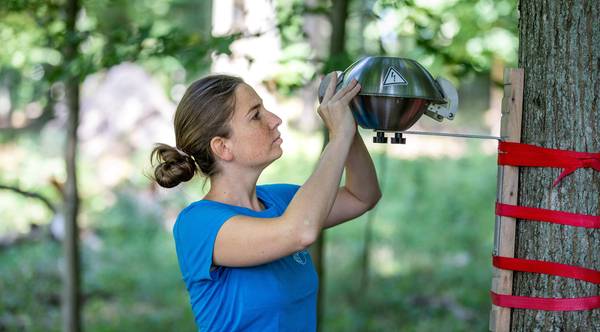
Press release – Umweltinstitut München e. V.
(Munich, this 8th March 2019) Pesticides from agriculture can spread uncon-trollably via the air. Which substances are in the air – when and where – was measured by the Munich Environmental Institute (Umweltinstitut München) in the South Tyrolean region of Vinschgau in 2018. The results were presen-ted by the independent environmental protection organisation today at a press conference in Mals. The results point to weaknesses in the EU authori-sation procedure – and to heavy air pollution in South Tyrol, Europe’s largest fruit-growing region.
„We could even find six active substances at above 1,600 metres in altitude in a side valley, several kilometres from the nearest orchards”, explains Karl Bär, de-partment head of agricultural policy at the Environmental Institute and leader of the measurement project. “When having a look at the authorisation reports of the European Food Safety Authority, then this should actually be impossible. For four of the substances it is concluded that they get into the air in negligible quantities and rapidly decompose there. Thus this assessment obviously seems to be wrong”, states Bär.
A measurement point was located in the middle of the village Mals, which in 2014, as Europe’s first municipality, decided to implement a municipal pestici-de ban in a sensational referendum vote. After a court ruling last year, however, spraying may be provisionally continued also within the municipal area of Mals. At the measurement point in a well-protected garden in the middle of the village, twelve different active substances were detected which also included highly hazar-dous substances such as captan or thiacloprid.
Two further measurement locations were located at organic farms in the central Vinschgau. There 20 of the tested 29 active substances were measured in the air. The pollution here is many times higher than in Mals. “Our results show how difficult conditions are for organic farms in the vicinity of intensively cultivated conventional apple orchards. Also residents and holidaymakers are verifiably expo-sed to pollution in the immediate vicinity of the orchards”, says Bär.
A special feature of the study of the Environmental Institute is the short intervals between the samples taken. It is thus possible to determine the temporal course of the spreading of substances via the air. A key finding is that there is a conti-nuous exposure of humans and nature to pesticides. Compared to individual active substances, the overall pollution causes a significantly higher exposure that continues to exist over the course of the season and thus a correspondingly higher risk potential.
„The state does not protect our health and our environment from exposure to toxic pesticides. The EU authorisation system makes unrealistic assumptions about their distribution and ignores the long-term exposure and the so-called cocktail effect which makes a combination of different substances more dangerous than the individual active substance”, criticises Bär.
„The rules that must be observed when spraying do not prevent the substances from spreading through the air. And there is no systematic measurement of air pollution by the authorities. The only way to consistently prevent our health and the environment from further exposure would be to stop using dangerous pesticides.“
Together with the Alliance Agriculture suitable for the Grandchildren and the indepen-dent environmental bureau TIEM Integrierte Umweltüberwachung GbR, the Environ-mental Institute will check the pesticide residues at around 200 locations in Germany in the current year.
Documents:
A summary of the results of the study can be found here.
The summary is also available in Italian and German.
Contact
Press Office
Fabian Holzheid Press officer, chairman fh@umweltinstitut.org Tel. +49 89 – 30 77 49 19 Mobile: +49 171 – 79 55 189
Umweltinstitut München e.V. Landwehrstr. 64a D-80336 Munich www.umweltinstitut.org
Photo: Umweltinstitut München – Agriculture consultant Christine Vogt installing a passive collector.
